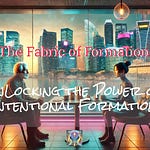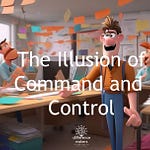The Gnawing Doubt
You know that certain kind of itch? The sort that’s just beyond reach that no amount of scratching can fix? It starts somewhere in the back of your mind, just out of reach, and mutters, Is this really it? Is this like, everything? Is this my life? Like all of it?
That was me, sitting at my ‘hot’ desk, staring at the flickering screen of my computer as if it held the answers to life’s existential mysteries. Spoiler alert!: it didn’t. Instead, it held emails—hundreds of them—each one a reminder of my slow, plodding march toward boring mediocrity.
Around me, the office hummed with the kind of energy that looks furiously productive on the surface but feels like a hollow sham. People moved about, tapping away at keyboards, nodding at each other in passing, pretending we were all on some grand journey to corporate enlightenment. But me? I was just trying to figure out why everyone else seemed so fine with it all.
Susan from HR floated by, her unnaturally bright smile slicing through my thoughts. “Morning! Big day ahead?” Her voice cut the air like a hyperactive child with a whistle.
I nodded, offering her a half-hearted smile that probably looked more like a grimace. Big day? Sure. If you count staring at spreadsheets and pretending to care about the latest synergy initiative as big.
The itch was growing, though. The one that said there was more to life than this. That maybe, just maybe, I was meant for something more. But what? And how?
The Seminar That Changed Nothing (Yet)
That’s when the email hit my inbox: Leading with Purpose Seminar – Last Chance!
I clicked it, not out of interest, but out of sheer desperation for distraction. I expected the usual corporate fluff—phrases like maximising your potential or achieving your goals—but instead, the first sentence grabbed me by the throat: "Do you ever feel like something's missing? Like you're meant for more than this?"
Yes. Yes, I do.
As I skimmed the email, a name jumped out at me: Madeline Marchbanks. She was leading the seminar. The Madeline Marchbanks. She had one of those names that carried weight, like it belonged to someone who knew important things. Things about life. Things that maybe, just maybe, could explain why I was stuck in this endless loop of discontent.
Without thinking—because if I thought about it too long, I’d talk myself out of it—I signed up. I wasn’t expecting a miracle, but I was desperate for something to shake me out of this rut. OK, I was expecting a miracle. I was, if I were being completely honest, hoping that someone else would magic me out of this rut.
‘Neuroplasticity’ the word popped out of the email. Oh, Yeah, I remembered reading about it in some article. The brain’s ability to change and adapt. Maybe that’s what I needed—a little rewiring. Or maybe I was just hoping for an escape hatch from the monotony.
Either way, I hit “Register.”
The Battle of Brain and Heart
The seminar was… underwhelming, to say the least. Madeline Marchbanks? Oh, she was good—too good. She had this way of talking that made you feel like she was speaking directly to your soul, like she’d seen into the darkest parts of your mind and found a way to laugh at them. She talked about purpose, about leading with intent, and for a moment, I believed her.
“People don’t become leaders by accident,” she said, her eyes locking onto mine in a way that made me feel seen. “You have to choose it. You have to believe it.”
But now, back in my cubicle, staring once again at those unread emails, the gnawing doubt returned. Could I really do this? Could I lead? Wasn’t leadership reserved for people who already had it all figured out? You know, the ones with the job title and the expensive suits?
Gilbert Grimshaw’s voice echoed in my head: “Potential isn’t enough, Percival. You lack execution.” Right. As if leadership was just a box you checked off on a to-do list.
I sighed. The amygdala, that lovely little almond shaped part of the brain responsible for fear, was having a field day with me. Fear is the brain’s way of protecting you from change, Madeline had said during the seminar. It’s an outdated survival instinct.
Maybe that’s all this was—my brain screaming at me to stay safe, to avoid the unknown. But I was tired of playing it safe. Maybe it was time to do something radical. Like believe in myself.
The Epiphany (Sort Of)
The project landed on my desk with all the grace of a dead fish. Grimshaw had handed it off with a smirk, his words dripping with condescension: “Lead it, or it drowns.”
I stared at the mess of timelines, data, and vague objectives, my heart sinking. My brain was already firing off its usual panic signals—cortisol, adrenaline, the works. It was like having a backseat driver screaming at you to turn around when all you wanted to do was move forward.
But then something shifted. A memory surfaced, something my mother had said to me once during one of her many life lessons: “For God didn’t give you a spirit of fear, but of power, love, and self-discipline.” (2 Timothy 1:7) or something like that.
Fear wasn’t supposed to define me. Power, love, and self-discipline—those were the tools I could have at my disposal. Not fear.
I took a deep breath. I didn’t have to have all the answers. I just had to take the first step. The rest would follow.
The Collapse
I wish I could tell you it all went perfectly from there. That I stepped into leadership with grace and confidence and everything clicked into place. But that would be a lie.
The first few days were chaos. People talking over each other, deadlines shifting like quicksand, and me, trying to hold it all together with nothing but a whiteboard and a growing sense of dread.
But then, little by little, things started to fall into place. Felicity Farnswell, my ever-cheerful colleague, pulled together a brilliant pitch deck. Sam Sedgewick, my so-called rival, actually contributed some solid ideas. And me? I found myself in the middle of it all, coordinating, encouraging, and—dare I say it—leading.
It felt like my brain was rewiring itself in real-time. Dopamine, I remembered Madeline called it, was firing every time we made progress, reinforcing these new neural pathways. Maybe I could do this. Maybe I could actually lead.
But just as quickly as things came together, they fell apart.
The final presentation bombed. Grimshaw tore it to pieces in front of the entire team, his icy gaze cutting through me like a lser. “This is subpar, Percival. I expected more.”
My heart sank. My brain, ever the pessimist, was already retreating to the safety of I told you so. The cortisol hit me like a wave, turning my thoughts into static.
I felt the fire inside me dim, flickering under the weight of failure. I knew it, I thought. I’m not cut out for this.
The Spark Reignites
But then, as I stood in the wreckage of our failed project, something Madeline had said came back to me: “Failure isn’t the end. It’s just a detour. Its an opportunity to evaluate and learn”
Right. A detour. Not a dead end.
I didn’t quit. I didn’t retreat. Instead, I went back to my team—Felicity, Sam, and the others—and we tore the project apart, piece by piece, and rebuilt it. Stronger. Better.
And this time? It worked.
The next presentation got approved. Grimshaw, of course, couldn’t bring himself to admit it, but I could see the begrudging respect in his eyes. And for the first time in a long time, I felt that spark reignite inside me.
Maybe leadership wasn’t about never failing. Maybe it was about failing, and then getting back up. About pushing forward, even when everything in your brain was telling you to give up.
As I looked around at my team, I felt something shift. Maybe I wasn’t Madeline Marchbanks. Maybe I’d never be like Grimshaw. But I didn’t need to be.
I just needed to be me.
Consider it pure joy when you face trials of many kinds, for the testing of your faith produces perseverance. (James 1:2, paraphrased). Perseverance. That was something I could get behind.
The Journey Begins
The office was still the same. The people were still tapping away at their keyboards, still laughing at jokes that weren’t funny, still pretending we were all on some grand journey to success.
But something had changed. Inside me.
The spark was still there, burning brighter now, and for the first time, I didn’t feel like a background character in my own life. I didn’t have all the answers, but I had something better: the courage to keep moving forward, even when the path wasn’t clear.
This wasn’t the end of the story. It was just the beginning.
Now, will you join me?
Questions for reflection
Question 1: Are You Living or Just Existing?
Engage with Your Inner Spark: Have you ever felt that itch, that gnawing doubt, whispering that there must be more to life? What holds you back from searching for deeper purpose and fulfillment in your daily routine?
Question 2: The Fear Factor—Protective Instinct or Limiting Barrier?
Unravel Your Fears: How often do you let fear take the wheel in your life decisions? Reflect on whether your caution is truly protective or if it's holding you back from unlocking your true potential like Percival.
Question 3: The Role of Failure in Your Life's Journey
Transforming Setbacks into Stepping Stones: How do you usually respond to failure, and do you see it as a dead end or an opportunity for growth? Can you think of a time when a setback turned into a spark for change or innovation in your life?












